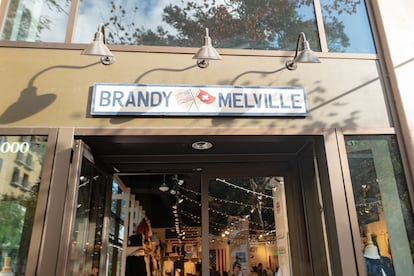How Brandy Melville, American teenage girls’ favorite brand, ended up engulfed in a racism and sexual harassment scandal
After several years of complaints piling up, the adolescent girls’ must-have label features in an HBO documentary which reveals the sordid practices of its owner, the elusive Stephan Marsan

In 2014, CEO of Abercrombie & Fitch Mike Jeffries resigned from his position. He did so after years of public accusations and lawsuits for racism and discrimination within the brand that glorified the white American heterosexual man. He did it because sales had plummeted. In 2022, the Netflix documentary White Hot: The Rise and Fall of Abercrombie & Fitch recalled the story of a brand that now seems to have recovered after issuing a public apology and advocating diversity and sustainability.
Also in 2014 American Apparel managed to “get rid” of its founder, Dov Charney, after several lawsuits for labor violations and sexual harassment of employees. If Abercrombie made a fortune with its muscular, shirtless young blonde men, American Apparel did so with its snapshots of anonymous young girls in openly sexual poses, many of them taken by Terry Richardson, a photographer who fell from grace after harassment complaints. Curiously, or maybe not, today Charney works as a manager at Yeezy, another brand cancelled by public opinion and owned by Kanye West.
That same year, 2014, Bloomberg published a report titled Brandy Melville: Instagram’s First Retail Success, which focused on how quickly the brand had become a favorite among American teenagers. Like American Apparel, Brandy Melville sells basic clothing for young people (tanks, shorts, colored tops) at prices slightly higher than those of other fast fashion brands, meaning that they are accessible but slightly ‘different’ from their competitors.
However, unlike Charney’s brand, its campaigns do not show women in leggings and provocative poses, but rather very young, long-haired Caucasian girls posing casually on the street or in front of the mirror. Its aesthetic is based on Tumblr-addicted teenagers who considered the Coachella festival to be the epitome of aspirational leisure. Although the Italian brand dates back to 2009, since it opened its stores in California in 2013, it has not stopped growing. It has nearly one hundred stores around the world and, according to The Wall Street Journal, it is estimated that it will have a turnover of more than $212 million in 2023.
Brandy Melville courted controversy for its strategy of offering only size S in its stores. Furthermore, taking into account that its clientele is mostly adolescents, the psychological havoc that its business model can wreak is beyond doubt. Later, it was understood that the business model was not always like this. The brand’s Italian owner, Stephan Marsan, decided to give the order to remove sizes larger than small from stores when the stores landed in the United States.
Business Insider journalist Kate Taylor revealed this decision in an extensive report published in 2021. She was the first to expose the very elusive Marsan, about whom hardly any information exists on the internet, and his more than questionable business practices. That article caught the attention of director Eva Orner, who has just released the documentary Brandy Hellville and the Cult of Fast Fashion on HBO: “I’ve done so many films in war zones and with refugees, and when I started this, I was like, what is happening here? I can’t get people to speak. We reached out to hundreds of girls. I think part of [the reticence to speak] is because they’re young girls, they’re scared,” Orner said in an interview with The Hollywood Reporter.
One full body photo a day to send to the boss
Both the documentary and the report offer statements from several former employees and some store managers. The girls who work at Brandy Melville stores, many of them teenagers, are recruited in the store itself for “adhering to the brand’s style.”
In a 2022 report in a California university magazine, two former shop assistants said that, when they were offered the job, they only asked for “full-body photos and the link to their social networks.” Brandy Melville’s Instagram, which is different for each region (in Spain it has 175,000 followers, and in the United States it has more than three million) is based on homemade photos of the brand’s staff or influencers, who are asked to advertise free in exchange for clothes. “Workers are instructed to take full-body pictures of themselves and send them to the manager daily, as well as ask to take pictures of customers who are ‘on trend,’” said a former employee in the 2022 report.
The company only hired thin, white women, according to the various reports and the documentary. If a worker gained weight, those in charge received orders to fire her. “If she was Black, if she was fat… [Marsan] didn’t want them in the store,” said Luca Rotondo, former vice president of the company.
The non-Caucasian girls worked in the warehouse, not facing the public. Rotondo and the directors of the company that owns the Canadian stores (Marsan operates with a series of companies and franchises to avoid responsibility) were themselves fired for refusing to fire their staff.
In addition to accusations of plagiarism from brands such as Forever 21 and Bubblered, Brandy Melville has had complaints of harassment. Marsan’s right-hand woman Jessy Longo has been accused of inappropriate behavior by three former employees; another accused the manager of one of the New York stores of harassment. Apparently, in that same store, one of the brand’s largest, the bosses can see the girls entering from the first floor and use a button to activate a red light to alert the manager that they want to hire her. In the documentary, Kate Taylor tells how the brand’s executives take their favorite employees on lavish trips, which are actually trips to Italian factories so they can choose the clothes they want and document those trips on social media. In these trips, the girls are “treated like queens.”
Antisemitic memes and clandestine factories
During Taylor’s investigation, former directors of Brandy Melville sent her screenshots of the WhatsApp groups they shared with Marsan. Among others, he sent them images of girls taking their breasts out of their shirts (“the shirt is clearly Brandy,” he comments), racist memes that compared a monkey with a Black boy or an image of Hitler congratulating them on the New Year. Marsan distributed Atlas Shrugged among his employees, a book by Ayn Rand that advocates individualism, the virtues of selfishness and extreme capitalism, and which became topical again for being claimed by the ultra-conservative North American right. “I called it the Brandy Melville Bible,” says one of the employees.
I got my hands on 150 screenshots of a group chat of male Brandy Melville higher ups — including the CEO — which was full of racist and antisemitic jokes https://t.co/dP5Z7HJBGP pic.twitter.com/NUYtDZMJET
— Kate Taylor (@Kate_H_Taylor) September 7, 2021
As one would expect, Marsan does not want to pay taxes. And for this, a million-dollar business with little traceability has been set up. Its name does not appear in any financial statements and its stores operate through local companies that are different in each country. It is a textile company that has a turnover of more than $200 million annually, but it is impossible to find any statements regarding its sustainability plans. What is detailed on their website is the origin of each product. They are mainly manufactured in China and Italy, where the brand originated. However, the documentary travels to Prato, the Italian area sadly famous for hosting clandestine factories where immigrant workers under exploitative conditions manufacture garments for fast fashion brands. It also travels to Accra, in Ghana, the place where 39,000 tons of clothing end up per year. Yes, Brandy Melville is also available there, although its production volume is less and its prices are somewhat higher than those of certain fast fashion platforms.
You can’t blame teenage girls for wanting to fit in with their high school peers. However, the firm that encourages one-size-fits-all should be blamed. Of course, it is not the wearers’ fault for feeling good about being complimented on their style or for wanting to work for a brand with which they identify, nor was it the fault of the dozens of victims who worked at American Apparel. However, as long as the authorities fail to take forceful measures, it is the customer who has the power to change things. Jeffreys left Abercrombie and Charney left American Apparel when sales had already plummeted and both brands were on the verge of bankruptcy. Firing the big boss is difficult, but not impossible.
Sign up for our weekly newsletter to get more English-language news coverage from EL PAÍS USA Edition
Tu suscripción se está usando en otro dispositivo
¿Quieres añadir otro usuario a tu suscripción?
Si continúas leyendo en este dispositivo, no se podrá leer en el otro.
FlechaTu suscripción se está usando en otro dispositivo y solo puedes acceder a EL PAÍS desde un dispositivo a la vez.
Si quieres compartir tu cuenta, cambia tu suscripción a la modalidad Premium, así podrás añadir otro usuario. Cada uno accederá con su propia cuenta de email, lo que os permitirá personalizar vuestra experiencia en EL PAÍS.
¿Tienes una suscripción de empresa? Accede aquí para contratar más cuentas.
En el caso de no saber quién está usando tu cuenta, te recomendamos cambiar tu contraseña aquí.
Si decides continuar compartiendo tu cuenta, este mensaje se mostrará en tu dispositivo y en el de la otra persona que está usando tu cuenta de forma indefinida, afectando a tu experiencia de lectura. Puedes consultar aquí los términos y condiciones de la suscripción digital.









































